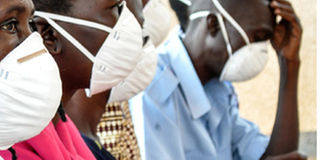District leaders worry over rising cases of TB

Seeking treatment. Isolated Tuberculosis (TB) patients line up for treatment at Gulu Referral Hospital.Budaka District leaders have expressed concern over rising cases of tuberculosis. FILE PHOTO
What you need to know:
The district tuberculosis focal person, Mr John Kasolo, at the weekend, observed that between April to June, more than 91 cases were registered unlike in the previous months, where less than 50 cases were recorded in the district.
Budaka District leaders have expressed concern over the rising cases of tuberculosis disease (TB).
The district tuberculosis focal person, Mr John Kasolo, at the weekend, observed that between April to June, more than 91 cases were registered unlike in the previous months, where less than 50 cases were recorded in the district.
“We are concerned over the alarming cases of tuberculosis. The district is being taken by surprise and we need to immediately focus on preventive measures,” Mr Kasolo said.
He explained that an assessment conducted by the district health team, discovered that many people, who are suffering from the disease are ignorant about its symptoms.
“There is an urgent need to sensitise the local communities about the current wave of TB-related cases and we have adopted to using burial ceremonies, school activities and trading centres to disseminate these messages as a strategy to scale down the spread of TB,” he said.
TB is spread through the air from one person to another. The TB bacteria is put into the air when a person with the disease of the lungs or throat coughs, sneezes, speaks or sings. People nearby may breathe in these bacteria and become infected.
The district Woman MP, Ms Pamela Nasiyo Kamugo, however, noted that majority of residents fear to turn-up to be diagnosed at the health centres because they feel they may be isolated in the community.
“Most of the health centres have TB drugs but there is a challenge of stigmatisation in the communities because people think when you have TB, you also have HIV/Aids, which might not be the case,” Ms Kamugo said.
The district LC5 chairperson, Mr Sam Mulomi, said people suffering from TB prefer self-medication to seeking treatment at health centres.
Mr Robert Mwemeke, 47, a resident of Bwase Village in Budaka Town Council, said the disease is silently killing many people in their rural areas because of ignorance.
TB prevalence survey
Ms Linda Ruvwa, a community coordinator for TB and leprosy in the Ministry of Health, said the national TB prevalence survey of 2014 to 2015, indicated that the rate was about 253 per 100,000 people, translating to about 86,000 Ugandans, who are infected. She added that four out of every 10 persons with TB were not diagnosed.
“Their stay within the community without seeking medical attention continues to spread the disease,” Ms Ruvwa said.
The Health ministry permanent secretary, Dr Diana Atwine, in February, blamed the increasing cases of TB in the country on failure by patients to seek proper treatment.
“Although we now have facilities at all general hospitals that can be used to test TB in the blood, many people with the disease use antibiotics to treat the disease. This has caused TB resistance to drugs,” she said.
Statistics at World Health Organisation estimated that about 1.4 million TB deaths were recorded in 2015.


